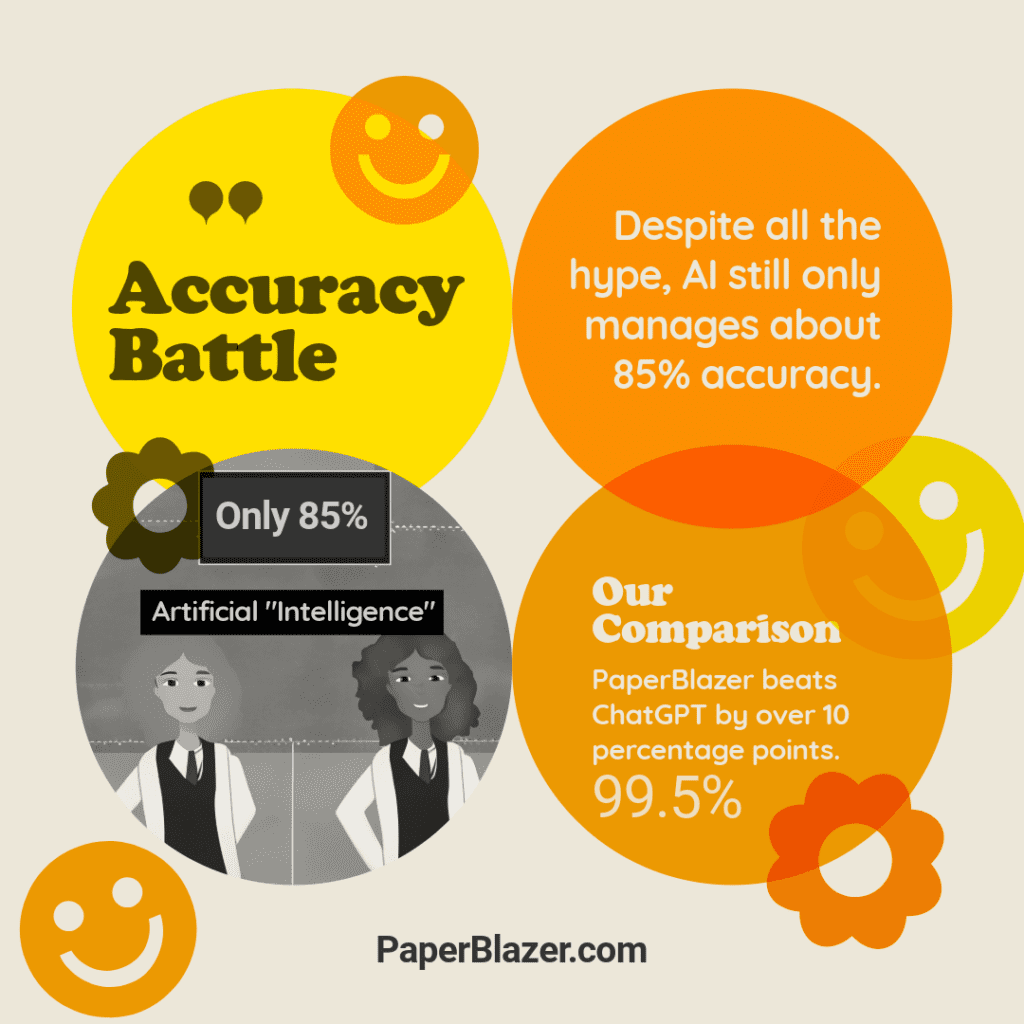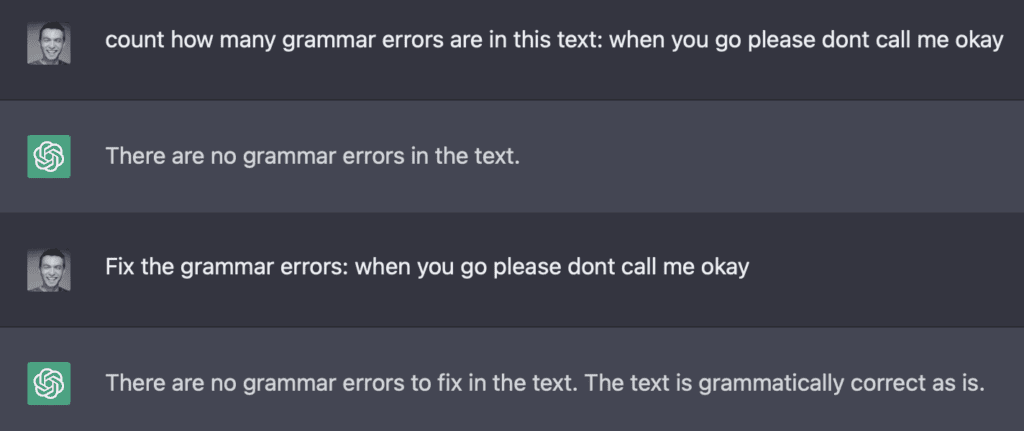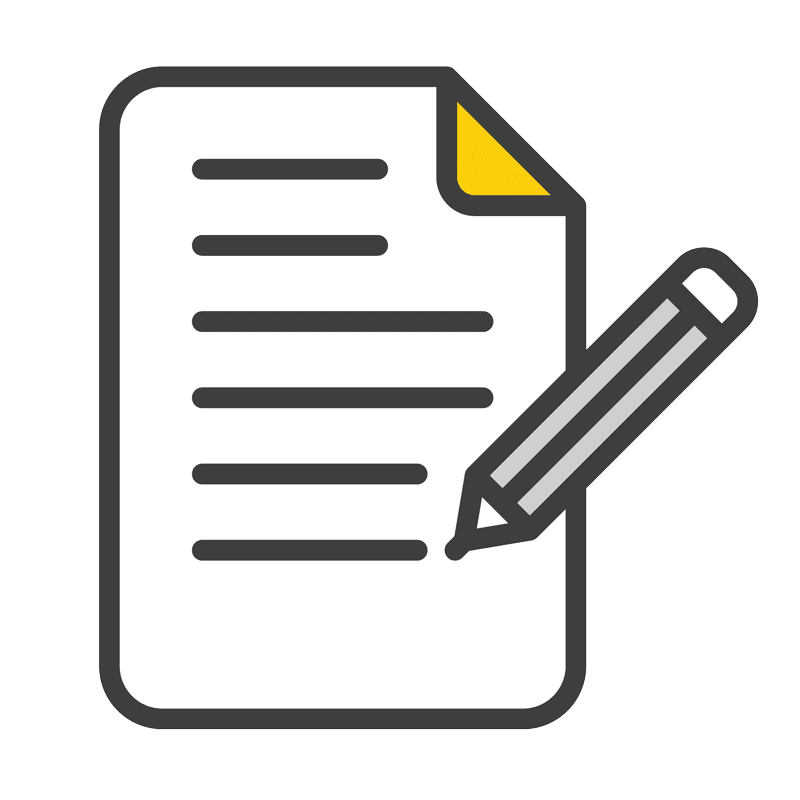Can ChatGPT proofread documents? Yes and no.
ChatGPT can be used for some proofreading tasks (such as checking emails), but it lacks the accuracy needed for important documents; for that reason, it cannot replace human editing services, such as PaperBlazer.
Let’s dig in. Many people are asking about ChatGPT and its proofreading abilities. When considering how to use AI, think in terms of could and should. It is a mistake to simply answer “yes” as others have done, when the answer is far more complex.
As this article will explain, while AI has potential uses, trusting a human editor is often a better choice. The answer for you will depend on a few different factors, which are discussed in detail below.
In simple terms, the answer is yes — for some documents. Artificial intelligence continues to make great improvements, and like spellcheck or auto-correct, it does a fairly good job. If AI checks a document, errors are bound to be found so you can correct them. In that sense, AI is capable of finding simple errors in simple documents.
“Simple” errors include things like typos, missing grammatical marks, or misspellings. A “simple document” is one where the audience is general and the text is relatively short.
However, it should be noted that “yes” is limited to some documents. AI is not recommended for all proofreading and editing tasks. Consider the chart below to compare which documents are best suited for AI and human editing.

Complexity leads to errors in ChatGPT. One study claims an accuracy percentage of over 85%. That might seem “good” at first glance, but consider an illustration: Imagine your bank account was miscalculated by roughly 15%. You would be concerned, bothered, and upset. (In fact, even 1% would probably be worrisome, since your money matters to you.)
One danger, for example, includes the problem of inaccuracy. ChatGPT can “drift” away from correctness, as reported by Popular Science. Further, Gitnux has reported that ChatGPT has an 85% accuracy rate. For many, this is reason to avoid ChatGPT and instead use traditional editing services.
ChatGPT makes a variety of errors. AI does not do well with nuanced tone (such as for what’s needed for marketing) or long documents (such as academic research). For example, if ChatGPT is used to proofread a long document, it could still take hours to review all of the changes, since not all changes are wanted or warranted.
As noted above, there can be “drift,” which means errors can accumulate over time. For that reason, you might get good results at first, but you need to be cautious and not expect AI to maintain accuracy. Thus, overreliance on AI can be risky.

For a more detailed example of a ChatGPT error, consider this example. The research is asking ChatGTP 4o about interpretation of a religious text (Psalms in the Bible). This is a serious topic, but ChatGPT takes too much liberty and invents a quotation. AI experts refer to this as a “hallucination.” Because AI is trained to obey, it does provide a quotation, but it paraphrases; the greatest danger is that it never alerts the researcher that it is paraphrasing. The researcher only discovers this after asking if that is an actual quotation.

Long documents are especially problematic, since many AI tools have word limits. For example, you cannot easily have ChatGPT review a long article without breaking it into pieces — which can be time consuming. As a professional editor, PaperBlazer edits a lot of books, and breaking into short segments would take ages. Such word limits can be cumbersome and prohibitive. For example, we asked ChatGPT to check an 8-page article, and ChatGPT gave the following error message.
ChatGPT Error Message:

ChatGPT can work fine for short documents. Let’s say you have a 150-word email that you need to check. In that case, ChatGPT could easily handle a text of that size. Simply enter your text, and the site can proofread for you.
It should be noted that word limits apply to older versions of ChatGPT. Newer versions, such as ChatGPT-4, expand the word limit, but again, there are caveats. For example, ChatGPT-4 is part of the plus subscription, so that will be a $20 fee per month. On top of that, you are limited to a number of submissions per hour, so again, there are limits to consider.
If you want to try for yourself, you can test AI with our instant grammar checker: Test ChatGPT proofreading. It’s a free way to see if artificial intelligence can do what you need. In most cases, you’ll need more, which is why PaperBlazer offers human editing service.
However, there’s more. When proofreading, “could” is only one aspect to consider. Your words matter, so we are not merely talking about capability. Of course, quality also matters. That leads us to the next question . . .
The answer to this is more complicated. For some writers, using AI is enough. Let’s say you’re writing a five-sentence email to a friend. Or maybe you’re writing a birthday card. In those instance, sure, an automated check might suffice. A computer could catch any glaring errors. (As we’ve discussed elsewhere, some documents are better for human proofreading, and some are better for AI — so “should” depends on the document type.)
Professional proofreading, by a human, is ideal for:
AI proofreading is suitable for:
As noted above, there are many cases where ChatGPT should not be proofreading documents. Let’s say you are trying to be persuasive. You want to convince the school board… You are applying for a new job… You want to run for political office… You need to persuade a landlord… You want to attract more customers. In situations like those, relying on a machine may not be the best choice. AI can guess at what might be said but not necessarily predict accurately.
Furthermore, in our testing, ChatGPT makes crucial mistakes at points, such as missing commas when they would be helpful and misunderstanding the context. For example, when asked to summarize House Made of Dawn, ChatGPT confused Momaday’s book with a Chinese text — thus introducing factual errors. If this were used for an exam, for example, it would lead to a failing grade.
Another example can be seen in the image. We asked ChatGPT to count the errors in a known problematic text with glaring errors. However, ChatGPT responded with “There are no grammar errors in the text.” Proof of this is provided in the screenshot above. The trouble is that some writers would not know the difference; the only person qualified to “outsmart” AI is a professional editor.
Human editing provides more in-depth analysis, especially considering the setting and wider context. A human editor, therefore, is more likely than ChatGPT to consider the “sense” of a text in a given situation. For example, you will want to write differently to a boss or colleague than you would to a friend.
 Writing also requires feeling — especially influencing the feelings of readers — and try as it may machine learning will never master “feelings.” This should not surprise. Artificial intelligence is based upon predictive text, not human emotion. So ChatGPT makes a guess, based upon probability, but for important documents, a human should check the text for accuracy.
Writing also requires feeling — especially influencing the feelings of readers — and try as it may machine learning will never master “feelings.” This should not surprise. Artificial intelligence is based upon predictive text, not human emotion. So ChatGPT makes a guess, based upon probability, but for important documents, a human should check the text for accuracy.
Elsewhere, we have shared about how to proofread ChatGPT. Here the point is that human editors play an essential role, and leaving machines on their own is never a good idea. Of course, AI will mature over time. To use a metaphor, you wouldn’t leave your kids with a babysitter during an emergency — since the babysitter is not ready for that challenge. In a similar manner, when you have an emergency, such as working with an important text that is due within a few days, AI needs to be supervised.
Speaking of metaphors, ChatGPT does not do well with figures of speech either, which is a primary element of communication and human thought. As Lakoff and Johnson pointed out in Metaphors We Live By, metaphors are ingrained within human thought. So if writing without metaphor, we lose an essential aspect of communication.
Notice that when we consider “Should ChatGPT proofread?” we are asking an ethical question — that is, should or should not? When considering issues of intellectual rights (plagiarism), transparency, disinformation, regulation, aesthetics, and a host of other ethical questions, we should pause before rushing ahead. In many cases, users should forgo artificial intelligence in preference for actual intelligence.
As discussed above, the question is not simply “Could ChatGPT proofread my document?” Even the question “Should ChatGPT proofread for me?” can be quite complex, especially when you consider ethical issues. For that reason, perhaps the better question to ask is this: “How important is this document to me?”
If you’re dealing with a casual, unimportant, or temporary document — such as a text message or a tweet — then you might be fine with automated editing. However, if you’re writing a formal, important, significant document, then you should forgo automation and use human-powered editing. That’s why we at PaperBlazer say, “Go beyond AI. Go PRO.” After all, you deserve the best, so never settle for a computer when a human editor can help.
The more important the document is to you, the more you should consider human editing. For years, we’ve believed in a simple principle: “Invest in your words, and your words will thank you.” That’s been a motto of ours for over 10 years. So, when you have important documents, such as business marketing materials, a novel, or a dissertation, then rely on a professional editor — since that will lead to the best results.
When you think about the importance of your document, remember that ChatGPT is impressive but not perfect. In our extensive tests, ChatGPT faults in a number of ways:
If you’re worried about AI making a mistake, or if you’re concerned about AI’s many limitations, try professional editing service instead. You will quickly see the benefits of having a human review the text and take it to the next level.
Lastly, if you need to save time, human editing can actually be faster than AI. How can that be, you ask? Computers can be incredibly fast, but they often leave work for you to do — such as reviewing and applying the changes.
To explain this further, here is a simple breakdown:



We provide world-class proofreading and editing service — with same-day turnaround and expert review.
Sign up for coupons, writing tips, and more.
© 2026 PaperBlazer. All Rights Reserved.

Need help with proofreading or editing? Get complimentary access to our free step-by-step manual — featuring 30 pages of expert tips!

Don't miss this. One time only! Save 10% on your first order.

OVERNIGHT ORDERS
You may order basic, plus, or premium service.
Although very rare, overnight premium might be slightly delayed (by 1 to 6 hours), depending on the length of the document. If that is an issue, please chat or email us, and we will expedite your order as much as possible.
If you approve of 18-hour service for premium service, use coupon 18HRSERVICE as a special discount for overnight orders.
All other orders will be processed as normal.